May 21
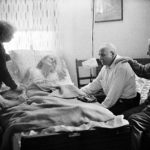 Advocating for ChangeWhen can taking photos help resolve a health crisis? When your mission is to educate and change people’s minds about the way things really are. Photojournalist Ed Kashi does just that as he takes on issues that stir his passions about the state of humanity. More
Advocating for ChangeWhen can taking photos help resolve a health crisis? When your mission is to educate and change people’s minds about the way things really are. Photojournalist Ed Kashi does just that as he takes on issues that stir his passions about the state of humanity. More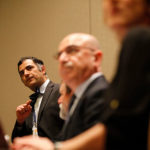 Climate Change: Call It What It IsScientific leaders agree there is climate change; political leaders do not. But speakers at Monday’s Global Perspectives on Climate Change said medical professionals have a responsibility to educate and protect patients against the health problems directly related to climate change. More
Climate Change: Call It What It IsScientific leaders agree there is climate change; political leaders do not. But speakers at Monday’s Global Perspectives on Climate Change said medical professionals have a responsibility to educate and protect patients against the health problems directly related to climate change. More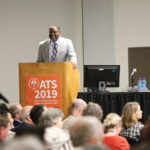 Celebrating 50 Years of HopeIn the 50 years since the NIH’s Division of Lung Diseases (DLD) launched, it has facilitated groundbreaking science that is leading to improved outcomes for lung diseases, such as asthma, respiratory distress syndrome in neonates, COPD, and ARDS. More
Celebrating 50 Years of HopeIn the 50 years since the NIH’s Division of Lung Diseases (DLD) launched, it has facilitated groundbreaking science that is leading to improved outcomes for lung diseases, such as asthma, respiratory distress syndrome in neonates, COPD, and ARDS. More Value-Based Care, Diversity, and AIDon’t miss the final two days of the ATS Keynote Series on Tuesday and Wednesday as speakers explore evidence for value-based care in pulmonary medicine, look at enhancing diversity and inclusion in academic medicine, and outline what pulmonologists should know about artificial intelligence and machine learning. More
Value-Based Care, Diversity, and AIDon’t miss the final two days of the ATS Keynote Series on Tuesday and Wednesday as speakers explore evidence for value-based care in pulmonary medicine, look at enhancing diversity and inclusion in academic medicine, and outline what pulmonologists should know about artificial intelligence and machine learning. More Right or Wrong: Controversies Continue in MedicineEvidence-based medicine holds considerable weight, but it is not without controversy. Many controversies surround the diagnosis and management of common conditions encountered in clinical practice. More
Right or Wrong: Controversies Continue in MedicineEvidence-based medicine holds considerable weight, but it is not without controversy. Many controversies surround the diagnosis and management of common conditions encountered in clinical practice. More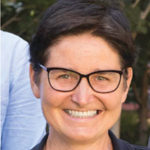 Debates to Drive the Future of PAH ResearchResearch in pulmonary arterial hypertension has reached a turning point in several areas. Should research continue its quest to find novel PAH genes? Should it continue to employ animal models? These topics and more will be debated Tuesday morning to help clarify the alternatives and chart future research. More
Debates to Drive the Future of PAH ResearchResearch in pulmonary arterial hypertension has reached a turning point in several areas. Should research continue its quest to find novel PAH genes? Should it continue to employ animal models? These topics and more will be debated Tuesday morning to help clarify the alternatives and chart future research. More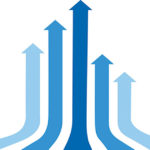 Session Unveils New Clinical Practice GuidelinesThis year’s ATS Clinical Practice Guidelines will spotlight the latest evidence-based clinical recommendations on idiopathic pulmonary fibrosis, malignant pleural effusions, obesity in OSA, fungal infections, and pediatric supplemental oxygen. More
Session Unveils New Clinical Practice GuidelinesThis year’s ATS Clinical Practice Guidelines will spotlight the latest evidence-based clinical recommendations on idiopathic pulmonary fibrosis, malignant pleural effusions, obesity in OSA, fungal infections, and pediatric supplemental oxygen. More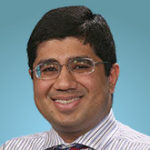 Translational Research Focuses on Complement CascadeOver the past few years, knowledge of the complement system has expanded, and researchers have identified several complement proteins as being synthesized in the lung and by key immune cells such as CD4+ T cells, dendritic cells, macrophages, and innate lymphoid cells. These cells play crucial roles in affecting the local microenvironment. In addition, recent studies have shown that complement proteins can modulate cell survival, polarization, and fate. More
Translational Research Focuses on Complement CascadeOver the past few years, knowledge of the complement system has expanded, and researchers have identified several complement proteins as being synthesized in the lung and by key immune cells such as CD4+ T cells, dendritic cells, macrophages, and innate lymphoid cells. These cells play crucial roles in affecting the local microenvironment. In addition, recent studies have shown that complement proteins can modulate cell survival, polarization, and fate. More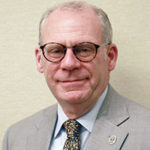 Q&A: James Beck: ATS President and Champion of EducationJames Beck, MD, ATSF, will serve as president of the ATS for the 2019-2020 term. He is professor of medicine in the Division of Pulmonary Sciences and Critical Care at the University of Colorado in Denver and vice chair for Veterans Affairs in the University of Colorado’s Department of Medicine. He is also chief of medicine for the VA Eastern Colorado Health Care System. More
Q&A: James Beck: ATS President and Champion of EducationJames Beck, MD, ATSF, will serve as president of the ATS for the 2019-2020 term. He is professor of medicine in the Division of Pulmonary Sciences and Critical Care at the University of Colorado in Denver and vice chair for Veterans Affairs in the University of Colorado’s Department of Medicine. He is also chief of medicine for the VA Eastern Colorado Health Care System. More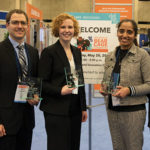 BEAR Cage Winner Nets $10,000Adrienne Campbell-Washburn, PhD, National Heart, Lung, and Blood Institute (NHLBI), won $10,000 in the fifth annual ATS BEAR Cage competition for her invention of a functional lung MRI. More
BEAR Cage Winner Nets $10,000Adrienne Campbell-Washburn, PhD, National Heart, Lung, and Blood Institute (NHLBI), won $10,000 in the fifth annual ATS BEAR Cage competition for her invention of a functional lung MRI. More Women’s Forum: Mentor, Mentee Secrets to SuccessIf a rising tide lifts all ships, the discussion at Monday’s Women’s Forum indicates the ATS fleet is striving to get stronger in years to come.The luncheon presentation focused on developing meaningful mentor-mentee relationships. More
Women’s Forum: Mentor, Mentee Secrets to SuccessIf a rising tide lifts all ships, the discussion at Monday’s Women’s Forum indicates the ATS fleet is striving to get stronger in years to come.The luncheon presentation focused on developing meaningful mentor-mentee relationships. More ATS Advocates for Better Health WorldwideThe ATS is the only medical society in respiratory medicine that maintains a Washington, D.C., government relations office. Through this office, the Society advocates on behalf of patients, members, and the profession. More
ATS Advocates for Better Health WorldwideThe ATS is the only medical society in respiratory medicine that maintains a Washington, D.C., government relations office. Through this office, the Society advocates on behalf of patients, members, and the profession. More Difficult-to-Treat Asthma: Getting it RightPeople truly have strong feelings about the proper diagnosis and management of difficult-to-treat and severe asthma in children, according to Heather Hoch, MD, assistant professor of pediatrics-pulmonary medicine at the University of Colorado in Aurora. More
Difficult-to-Treat Asthma: Getting it RightPeople truly have strong feelings about the proper diagnosis and management of difficult-to-treat and severe asthma in children, according to Heather Hoch, MD, assistant professor of pediatrics-pulmonary medicine at the University of Colorado in Aurora. More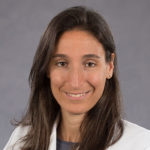 Nights in the ICU Can Impact Patient CareWhen the sun goes down, the ICU patient experience changes. New shifts begin, sleep disturbances are common, and an end to visiting hours can all affect a patient’s overnight experience. More
Nights in the ICU Can Impact Patient CareWhen the sun goes down, the ICU patient experience changes. New shifts begin, sleep disturbances are common, and an end to visiting hours can all affect a patient’s overnight experience. More- Want to Join the MECOR Faculty?The ATS Methods in Epidemiologic, Clinical, and Operations (MECOR) Program is recruiting new faculty members. More
May 20
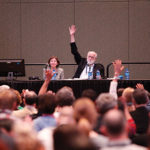 Mindsets Direct Medical Decision-MakingIf medicine is a science and based on facts and research, why do physicians disagree? The difficulty—and often uncertainty—surrounding medical decision-making was the topic of Sunday morning’s ATS Lecture Keynote Series. More
Mindsets Direct Medical Decision-MakingIf medicine is a science and based on facts and research, why do physicians disagree? The difficulty—and often uncertainty—surrounding medical decision-making was the topic of Sunday morning’s ATS Lecture Keynote Series. More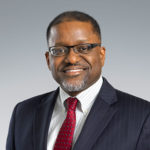 DLD Paves the Way for the Science of the FutureSince 1969, the National Institutes of Health’s Division of Lung Diseases (DLD) has facilitated the development of a robust and vibrant research community, which has produced research findings that have changed practice. More
DLD Paves the Way for the Science of the FutureSince 1969, the National Institutes of Health’s Division of Lung Diseases (DLD) has facilitated the development of a robust and vibrant research community, which has produced research findings that have changed practice. More Strategies for Teaching Modern LearnersEffective ways of teaching and disseminating knowledge have changed rapidly. The current climate of fast, ready-to-go access to information has altered how learners interact with content, and adult learning theories have changed the way content is delivered. More
Strategies for Teaching Modern LearnersEffective ways of teaching and disseminating knowledge have changed rapidly. The current climate of fast, ready-to-go access to information has altered how learners interact with content, and adult learning theories have changed the way content is delivered. More Confronting Obstacles in Critical Care TrialsSuccessful completion of critical care trials is fraught with barriers. These barriers may include engaging with surrogates, as patients often cannot consent. Patients’ health can quickly take a turn for the worse and eliminate them from trials, resulting in missing data. More
Confronting Obstacles in Critical Care TrialsSuccessful completion of critical care trials is fraught with barriers. These barriers may include engaging with surrogates, as patients often cannot consent. Patients’ health can quickly take a turn for the worse and eliminate them from trials, resulting in missing data. More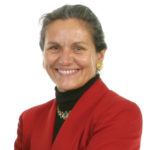 Outstanding Scientists to Present ResearchRecognition Awards for Scientific Accomplishments are presented each year to four scientists to recognize outstanding scientific contributions in basic or clinical research that enhance the understanding, prevention, and treatment of respiratory disease or critical illness. More
Outstanding Scientists to Present ResearchRecognition Awards for Scientific Accomplishments are presented each year to four scientists to recognize outstanding scientific contributions in basic or clinical research that enhance the understanding, prevention, and treatment of respiratory disease or critical illness. More BEAR Cage 2019: Meet the FinalistsThree early career investigators are vying for a $10,000 cash prize during the ATS BEAR Cage competition on Monday afternoon. Each will “pitch” his or her proposal to a panel of translational science experts, which will ultimately select the winner. More
BEAR Cage 2019: Meet the FinalistsThree early career investigators are vying for a $10,000 cash prize during the ATS BEAR Cage competition on Monday afternoon. Each will “pitch” his or her proposal to a panel of translational science experts, which will ultimately select the winner. More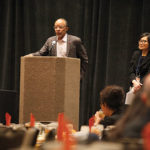 Growing Into ActivismMichael DeBaun, MD, MPH, the keynote at Saturday’s ATS Diversity Forum, has a list of accolades. At 59, he has the freedom to look back and advise the next generation of leaders about what diversity means in the medical community. More
Growing Into ActivismMichael DeBaun, MD, MPH, the keynote at Saturday’s ATS Diversity Forum, has a list of accolades. At 59, he has the freedom to look back and advise the next generation of leaders about what diversity means in the medical community. More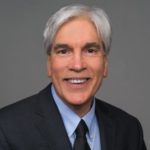 Endobronchial Valves a New Option for Severe EmphysemaThe FDA has recently approved two minimally invasive endobronchial valves (EBV) that mimic the effects of LVRS and can be placed endoscopically as a new option for these patients. More
Endobronchial Valves a New Option for Severe EmphysemaThe FDA has recently approved two minimally invasive endobronchial valves (EBV) that mimic the effects of LVRS and can be placed endoscopically as a new option for these patients. More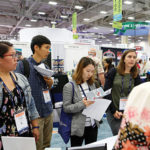 Students Walk in Patients’ FootstepsStudent Scholars Program participants received a crash course in nonprofits in the lung disease community at Saturday’s PAR Path. More
Students Walk in Patients’ FootstepsStudent Scholars Program participants received a crash course in nonprofits in the lung disease community at Saturday’s PAR Path. More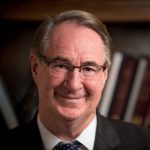 Keynote Series: Data Sharing and BreathlessnessThe ATS Keynote Series continues today as speakers explore the mysteries of breathlessness in COPD and data sharing in the context of clinical trials. More
Keynote Series: Data Sharing and BreathlessnessThe ATS Keynote Series continues today as speakers explore the mysteries of breathlessness in COPD and data sharing in the context of clinical trials. More Does Vaping Lead to Smoking?There has been a 78 percent increase in the number of high school students who are using e-cigarettes, JUUL pods, or similar products, and a 48 percent rise in use among middle schoolers, according to a 2018 National Youth Tobacco Survey. Those percentages represent an increase of 1.5 million users in just one year. Health care professionals are increasingly alarmed by the statistics. More
Does Vaping Lead to Smoking?There has been a 78 percent increase in the number of high school students who are using e-cigarettes, JUUL pods, or similar products, and a 48 percent rise in use among middle schoolers, according to a 2018 National Youth Tobacco Survey. Those percentages represent an increase of 1.5 million users in just one year. Health care professionals are increasingly alarmed by the statistics. More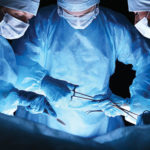 Controversies in the Management of PEPulmonary embolism is one of the leading causes of preventable deaths among hospitalized patients. Advances in diagnostic and therapeutic techniques have expanded the number of potential therapies, and researchers are continuing to expand the evidence base and learn how to use these treatments. As a result, treatment decision-making has become more complex. More
Controversies in the Management of PEPulmonary embolism is one of the leading causes of preventable deaths among hospitalized patients. Advances in diagnostic and therapeutic techniques have expanded the number of potential therapies, and researchers are continuing to expand the evidence base and learn how to use these treatments. As a result, treatment decision-making has become more complex. More Bringing Pulmonary Rehab to Patients With Non-COPD DiseaseThe newest medical research is putting a spotlight on the care and delivery of pulmonary rehabilitation in patients with non-COPD chronic respiratory disease. More
Bringing Pulmonary Rehab to Patients With Non-COPD DiseaseThe newest medical research is putting a spotlight on the care and delivery of pulmonary rehabilitation in patients with non-COPD chronic respiratory disease. More
May 19
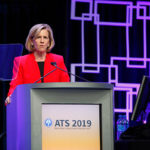 Collaborating for a Brighter FuturePolly Parsons, MD, ATSF, president of the American Thoracic Society, opened the 115th ATS International Conference Saturday afternoon by welcoming Mary E. Klotman, dean of the Duke University School of Medicine and vice chancellor for Health Affairs as the guest speaker. More
Collaborating for a Brighter FuturePolly Parsons, MD, ATSF, president of the American Thoracic Society, opened the 115th ATS International Conference Saturday afternoon by welcoming Mary E. Klotman, dean of the Duke University School of Medicine and vice chancellor for Health Affairs as the guest speaker. More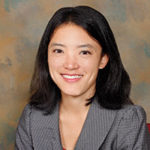 ATS Pays Tribute to Scientists at Opening CeremonyThree scientists were recognized for their exceptional contributions to medicine and research during the opening ceremony on Saturday. More
ATS Pays Tribute to Scientists at Opening CeremonyThree scientists were recognized for their exceptional contributions to medicine and research during the opening ceremony on Saturday. More Using Big Data to Shape a New LHSImagine a health care system so advanced that it continuously gathers and analyzes the massive amount of data generated in the ICU to improve patient care in real time. More
Using Big Data to Shape a New LHSImagine a health care system so advanced that it continuously gathers and analyzes the massive amount of data generated in the ICU to improve patient care in real time. More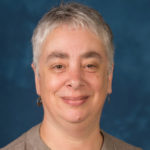 Keynote Series: Decisions and Implementation ScienceThe ATS Keynote Series features a diverse group of speakers who will present cutting-edge research and their own perspectives on a variety of topics highly relevant to the pulmonary, critical care, and sleep medicine community. Today’s speakers will examine medical decision-making and implementation science. More
Keynote Series: Decisions and Implementation ScienceThe ATS Keynote Series features a diverse group of speakers who will present cutting-edge research and their own perspectives on a variety of topics highly relevant to the pulmonary, critical care, and sleep medicine community. Today’s speakers will examine medical decision-making and implementation science. More Helping Lungs Self-Repair After InjuryTen years ago, pulmonologists understood that a damaged adult lung could repair itself under certain circumstances via the plasticity of well-defined progenitor cells that sense when resident cells are damaged.
More
Helping Lungs Self-Repair After InjuryTen years ago, pulmonologists understood that a damaged adult lung could repair itself under certain circumstances via the plasticity of well-defined progenitor cells that sense when resident cells are damaged.
More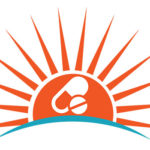 JAMA/NEJM Editors, Authors Discuss New ResearchBe a part of the discussion as editors and authors present papers that were recently published in the Journal of the American Medical Association and the New England Journal of Medicine. More
JAMA/NEJM Editors, Authors Discuss New ResearchBe a part of the discussion as editors and authors present papers that were recently published in the Journal of the American Medical Association and the New England Journal of Medicine. More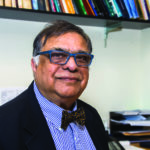 Four Honored for Outstanding Efforts in MedicineThe ATS will recognize four physicians and researchers for their remarkable contributions to medicine during Sunday’s Awards Session, featuring the Amberson Lecture and the presentation of the Trudeau Medal and two Distinguished Achievement Awards. More
Four Honored for Outstanding Efforts in MedicineThe ATS will recognize four physicians and researchers for their remarkable contributions to medicine during Sunday’s Awards Session, featuring the Amberson Lecture and the presentation of the Trudeau Medal and two Distinguished Achievement Awards. More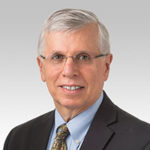 Trudeau Medalist’s Research Creates New Paradigm for ARDS TreatmentJacob I. Sznajder, MD, is the recipient of the 2019 Edward Livingston Trudeau Medal, which recognizes significant contributions to the prevention, diagnosis, and treatment of lung disease. More
Trudeau Medalist’s Research Creates New Paradigm for ARDS TreatmentJacob I. Sznajder, MD, is the recipient of the 2019 Edward Livingston Trudeau Medal, which recognizes significant contributions to the prevention, diagnosis, and treatment of lung disease. More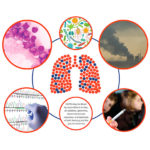 COPD Is Not a Geriatric DiseaseConventional wisdom suggests that COPD is a disease that typically strikes later in life. The reality is that COPD may start in early childhood. It just doesn’t become obvious in most patients until their sixth or seventh decade of life. More
COPD Is Not a Geriatric DiseaseConventional wisdom suggests that COPD is a disease that typically strikes later in life. The reality is that COPD may start in early childhood. It just doesn’t become obvious in most patients until their sixth or seventh decade of life. More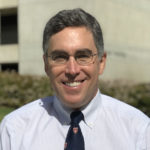 Inspired to LearnOn behalf of the American Thoracic Society International Conference Committee, welcome to Dallas and ATS 2019! More
Inspired to LearnOn behalf of the American Thoracic Society International Conference Committee, welcome to Dallas and ATS 2019! More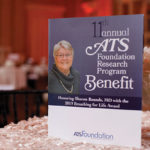 Rounds Honored as ATS Foundation Champion and BenefactorThe ATS Foundation presented Dr. Rounds with the 2019 Breathing for Life Award—the highest honor given to an ATS member for philanthropy—during the 11th annual ATS Foundation Research Program Benefit on Saturday evening at Union Station in Dallas. More
Rounds Honored as ATS Foundation Champion and BenefactorThe ATS Foundation presented Dr. Rounds with the 2019 Breathing for Life Award—the highest honor given to an ATS member for philanthropy—during the 11th annual ATS Foundation Research Program Benefit on Saturday evening at Union Station in Dallas. More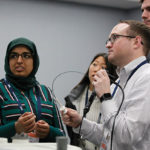 Early Career Professionals Tap ResourcesCareer advice, small-group learning, hands-on training, and networking comprised key elements of the ATS programming for Early Career Professionals on Friday and Saturday. More
Early Career Professionals Tap ResourcesCareer advice, small-group learning, hands-on training, and networking comprised key elements of the ATS programming for Early Career Professionals on Friday and Saturday. More- Taking Credit: MOC and CMEEach year, the ATS Educational and the International Conference committees collaborate to ensure that International Conference symposia are eligible for Maintenance of Certification points. More
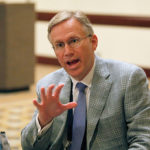 PAR Encourages Patient EmpowermentTaking charge of your own lung health was the theme of Saturday’s ATS Public Advisory Roundtable (PAR) Meet the Experts panel. More
PAR Encourages Patient EmpowermentTaking charge of your own lung health was the theme of Saturday’s ATS Public Advisory Roundtable (PAR) Meet the Experts panel. More Sharp Intakes: RIS Unites Innovators and InvestorsThe second annual Respiratory Innovation Summit welcomed nearly 70 speakers and more than two dozen startup companies who previewed dozens of new therapies, drugs, devices, and diagnostics designed to treat respiratory disease. More
Sharp Intakes: RIS Unites Innovators and InvestorsThe second annual Respiratory Innovation Summit welcomed nearly 70 speakers and more than two dozen startup companies who previewed dozens of new therapies, drugs, devices, and diagnostics designed to treat respiratory disease. More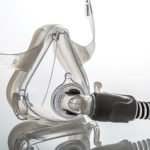 Pro/Con: Managing OSA and PAP TherapyWhen it comes to choosing the most appropriate treatment for a patient with sleep-disordered breathing, clinicians must make controversial choices. More
Pro/Con: Managing OSA and PAP TherapyWhen it comes to choosing the most appropriate treatment for a patient with sleep-disordered breathing, clinicians must make controversial choices. More The Obesity, Asthma EquationObesity has long been recognized as a significant risk factor for asthma. Nearly 60 percent of patients with severe asthma are obese, presenting a host of treatment challenges. In general, obese patients do not respond as well to conventional asthma therapies as lean patients. This leaves health care providers on the hunt for new options. More
The Obesity, Asthma EquationObesity has long been recognized as a significant risk factor for asthma. Nearly 60 percent of patients with severe asthma are obese, presenting a host of treatment challenges. In general, obese patients do not respond as well to conventional asthma therapies as lean patients. This leaves health care providers on the hunt for new options. More Research Approach May Change Drug DevelopmentIn classical pharmacology, drug-receptor interactions are considered under static conditions. A relatively new concept, mechanopharmacology, differs in that the normal mechanical environment of a tissue is a factor, with potentially significant impacts on function. More
Research Approach May Change Drug DevelopmentIn classical pharmacology, drug-receptor interactions are considered under static conditions. A relatively new concept, mechanopharmacology, differs in that the normal mechanical environment of a tissue is a factor, with potentially significant impacts on function. More- Keynote Series: Speaker Transparency Results in Scientific Integrity International Conference speakers are required to take several steps to ensure that ATS audiences are aware of any professional or personal relationships they have with companies that are relevant to their presentation content. More
